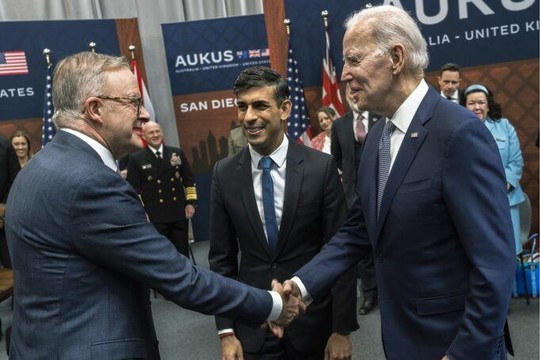AUKUS leaders: President Biden and prime-minisres Anthony Albanese and Rishi Sunak.
Photo: U.S. Secretary of Defense
The hawkish disposition of media outlets in a number of countries in shrieking for war is becoming palpable, writes Binoy Kampmark, a Commonwealth scholar at Selwyn College, Cambridge, he also lectures at RMIT University, Melbourne, Australia.
The Fairfax press in Australia gave a less than admirable example of this in their absurd Red Alert series, crowned by crowing warmongers warning Australia to get ready for the imminent confrontation. The publications were timed to soften the public for the inevitable, scandalous and possibly even treasonous announcement that the Australian government would be spending A$368 billion in local currency on needless submarines against a garishly dressed-up threat backed by ill-motivated allies.
For days, the Australian press demonstrated a zombie-like adherence to the war line that had been fed by deskbound generals and deranged civilian strategists desperate to justify their supper.
The desperation of such a measure is also a reflection of how public opinion rejects the war drive. In a 2022 poll by the Lowy Institute think tank, 51% of Australians said they preferred their country to remain “neutral” in a conflict between the US and China over Taiwan. This was not a bad return, given the repetitious insistence by various Australian government ministers that joining a war with the United States over Taiwan was simply assumed.
The introductory note of one article in that Rupert Murdoch-owned organ was not encouraging. “Since 2018, the [US] military has shifted to focus on China and Russia after decades fighting insurgencies, but it still faces challenges to produce weapons and come up with new ways of waging war.”
The obsession with war scenarios rather than diplomatic ones is hardening. It elevates the game to level pegging with peace overtures.
As defence analyst William Hartung writes, the Pentagon has never been short of cash in its pursuits, though it has been more than wasteful, obsessed with maintaining a global military presence spanning 750 bases and 170,000 overseas troops, not to mention the madness of shovelling $2 billion into developing a new generation of nuclear weapons. Far from encouraging deterrence, this is bound to “accelerate a dangerous and costly arms race.”
The same must be said of AUKUS, the triumvirate alliance that is already terrifying several powers in the Indo-Pacific into joining the regional arms race. Here we see, yet again, the Anglosphere enthralled by protecting their possessions and routes of access, directly or indirectly held.
In the red mist of war, lucid voices can be found. Singaporean diplomat and foreign policy intellectual Kishore Mahbubani is one to offer a bracing analysis in observing that China is hardly going to undermine the very order that has benefitted it. The Chinese, far from wishing to upend the rules-based system with thuggish glee, saw it as a gift of Western legal engineering. “So the paradox about the world today is that even though the global rules based order is a gift of the west, China embraces it.”
He also has this to say about the US-China relationship. “China has been around for 5,000 years. The United States has been around for 250 years. And it’s not surprising that a juvenile like the United States would have difficulty dealing with a wiser, older civilisation”.
read more in our Telegram-channel https://t.me/The_International_Affairs

 12:04 27.03.2023 •
12:04 27.03.2023 •























